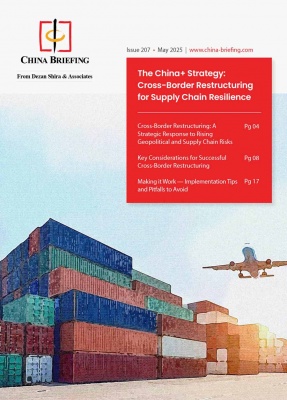China Unveils Three-Year Business Environment Plan for Beijing-Tianjin-Hebei Region
China’s new Three-Year Action Plan for the Beijing-Tianjin-Hebei region focuses on standardizing business regulations, enhancing regional integration, and promoting innovation in key industries. The plan’s comprehensive measures are designed to attract investment, stabilize the market, and elevate the region’s global competitiveness.
On August 19, 2024, China’s National Development and Reform Commission (NDRC) introduced the Three-year Action Plan for the Creation of First-class Business Environment in the Beijing-Tianjin-Hebei Region (hereinafter, the “action plan”) to revitalize the business environment in the Beijing-Tianjin-Hebei region (commonly referred as “Jing-Jin-Ji” based on Chinese abbreviations). The plan aims to create a world-class business climate that promotes regional economic integration, supports enterprise growth, and enhances the area’s overall competitiveness.
Targeting key challenges such as local protectionism, market fragmentation, and regulatory inconsistencies, the action plan outlines 19 measures across six focus areas. These measures are designed to streamline business operations, remove barriers to cross-regional activity, and foster a more unified economic environment.
In this article, we delve into the key components of the action plan, analyze its potential impact on the Beijing-Tianjin-Hebei region, and discuss the broader implications for businesses operating within this strategic economic corridor.
Key focus areas and proposed measures of the action plan
Standardizing business registration and operations
To streamline and standardize market operations, the action plan aims to remove unnecessary restrictions on cross-regional business activities and eliminate the requirement for businesses to register in specific locations without legal justification. It also simplifies the process for businesses relocating by integrating registration and archival services and ensuring smooth information sharing for both company registrations and deregistration.
The action plan also focuses on fostering fair competition and encouraging innovation. It proposes enhanced cooperation in antitrust enforcement and fair competition reviews through mutual checks and shared information. To boost cross-regional innovation, the plan supports:
- The creation of joint research and development hubs
- The facilitation of patent commercialization
- The development of technology platforms to address key industry challenges
Additionally, a key goal is to improve the business environment in critical industries such as semiconductors, cybersecurity, and emergency equipment, with a focus on building advanced manufacturing clusters.
Strengthening legal protection for businesses
To ensure and optimize legal protections for businesses across the Beijing-Tianjin-Hebei region, the action plan proposes the introduction of a collaborative mechanism using the 12345 government service hotline to handle business complaints and strengthen legal services related to business rights. It also aims to improve the handling of intellectual property issues by establishing efficient processes for case referrals, investigations, and enforcement, as well as enhancing cross-regional judicial cooperation.
The plan seeks to unify regulatory standards and enforcement practices across the region by:
- Developing joint regulatory policies and standards;
- Promoting consistent administrative guidelines in antitrust, food safety, environmental protection, and credit supervision; and
- Enhancing cross-regional regulatory coordination with regular meetings, emergency responses, and better resource sharing.
Notably, the proposed measures emphasize enhanced coordination across regions, particularly in key areas such as antitrust enforcement, food safety, environmental protection, and credit supervision.
Boosting international trade and investment
This section focuses on enhancing digital trade and investment within region by aligning with international standards. It aims to improve cross-border digital transactions by adopting best practices in areas like paperless trade, electronic payments, and fair treatment of digital products. The goal is to create a seamless trading environment and lower barriers to trade.
Additionally, the action plan ensures that foreign investors receive equal treatment by implementing a national treatment system and managing investments through a negative list. This means that sectors not restricted are open to all investors on an equal footing. It includes delegating administrative powers to local free trade zones (FTZs) and expanding the use of a notification and commitment system for approvals.
At the state level, there has long been a requirement to grant foreign investors equal treatment by implementing a national treatment system and managing investments through a negative list. However, the actual implementation largely depends on local administrations. In this context, the goals outlined in the action plan are undoubtedly a positive signal for foreign investors conducting business in this region. – Ines Liu, Head of the Australian Desk & Senior Manager of International Business Advisory at the Beijing Office, Dezan Shira & Associates
Optimization of government services
This focus area of the action plan focuses on making government services more efficient and accessible across the Beijing-Tianjin-Hebei region. It aims to standardize administrative procedures so that businesses experience consistent service quality no matter where they are in the region. It also includes updating and expanding the list of shared electronic certificates and supporting various service models like online processing and remote assistance to make interactions with government services smoother.
Additionally, the action plan seeks to improve data sharing and integration by setting up a coordinated system for sharing government data across regions and departments. These efforts are intended to enhance transparency and streamline administrative processes, making government services more effective and easier to navigate for businesses and investors.
Promotion of public services
The action plan focuses on enhancing public service collaboration and supporting regional development across Beijing, Tianjin, and Hebei. In education, it promotes cross-regional cooperation by connecting top schools and kindergartens from Beijing and Tianjin with those in Hebei, while also forming alliances among universities and vocational institutions to optimize resources. Additionally, it supports initiatives for unified vocational education and entrance exams.
In healthcare, the action plan aims to strengthen the regional medical network by expanding telemedicine, improving direct settlement services for cross-regional medical expenses, and ensuring mutual recognition of medical test results. It also encourages the growth of private medical institutions by removing restrictions on clinic placements and ensuring access to advanced equipment.
In human resources, the focus is placed on updating employment policies, standardizing services, and recognizing professional qualifications across the three regions.
Enhancing the business environment in Xiong’an New Area
For the Xiong’an New Area, the action plan focuses on improving business services, expanding financial openness, and fostering a vibrant entrepreneurial ecosystem, by enacting the following measures:
- Flexible land use: Introducing options like long-term leasing and lease-to-own arrangements to create a business-friendly land supply model.
- Streamlined approvals: Refining the investment project approval process to align with strategic goals and improve resource allocation.
- Efficient land allocation: Implementing a list-based approach for social investment projects to optimize land use.
- Faster construction approvals: Enhancing collaboration and workflows to expedite the approval process for construction projects.
Regarding Xiong’an, the action plan emphasizes financial innovation and entrepreneurship. Key measures include leveraging both domestic and international markets through initiatives like the Qualified Foreign Limited Partner (QFLP) program and cross-border RMB loans. The action plan aims to streamline financial operations by integrating domestic and foreign currencies, attract stable foreign investment in green finance and eldercare, and support enterprise listings on the Beijing Stock Exchange and the New Third Board. Additionally, it seeks to improve trade efficiency with a smart customs system and a panoramic visualization platform in the Xiong’an Comprehensive Bonded Zone.
To foster innovation and entrepreneurship, the action plan proposes a market access system that lowers entry barriers by allowing businesses to operate based on compliance commitments. It also aims to position Xiong’an as a high-tech zone through the establishment of a national alliance for aerospace information and satellite internet innovation.
Furthermore, the initiative focuses on attracting high-end talent from Beijing and facilitating the mobility of professionals in the medical and educational fields to drive industry development and innovation.
Complementary measures to boost the Beijing-Tianjin-Hebei region
The Beijing-Tianjin-Hebei region is a key focus of China’s economic strategy. In tandem with the measures proposed in the action plan, the government has already unveiled a series of initiatives aimed at fostering world-class industrial clusters and enhancing regional development. A recent highlight is the New Implementation Plan for Coordinated Development of Industries in the Jing-Jin-Ji Region, launched in May 2023. This plan emphasizes the growth of emerging sectors such as electric vehicles, biopharmaceuticals, hydrogen energy, and high-end industrial machinery, positioning the region as a global leader in these cutting-edge industries.
The plan introduces strategic measures to optimize regional industrial division and enhance productivity across Beijing, Tianjin, and Hebei. By focusing on deepening collaboration in key sectors, strengthening industrial chains, and accelerating the transition to green and digital economies, the plan seeks to create a more integrated and resilient economic ecosystem. Notably, the development of specialized economic zones, extensive 5G infrastructure, and green manufacturing systems further bolster the region’s capacity for innovation and sustainable growth.
Adding to these efforts, China’s central bank and regulatory bodies have unveiled a comprehensive financial plan to elevate Tianjin’s status within the Jing-Jin-Ji region. This initiative includes 34 key measures aimed at strengthening financial support for innovation, integrating finance with digital technology, and enhancing green finance and financial supervision. A notable feature is the proposed Beijing-Tianjin-Hebei joint credit mechanism, designed to promote the flow of credit resources across the region, particularly for technology industries and major cooperative projects. This financial boost, alongside the industrial development plan, underscores the government’s commitment to transforming the Jing-Jin-Ji area into a hub of economic innovation and global competitiveness.
Expected impact of the action plan
The action plan is set to significantly enhance the Beijing-Tianjin-Hebei region by tackling key inefficiencies and fostering a more cohesive economic environment. By eliminating restrictive local regulations and standardizing business registration processes, the plan aims to streamline operations across jurisdictions, thus removing barriers for businesses. This streamlined approach is anticipated to attract increased regional investment, as companies benefit from smoother cross-regional operations and relocations.
Additionally, the action plan’s focus on creating a unified regulatory framework and promoting fair competition is expected to improve market predictability and stability, drawing interest from both domestic and international investors. Support for critical industries like semiconductors and cybersecurity, along with advancements in financial and business services in the Xiong’an New Area, reflects a strategic push to drive technological and economic progress. Overall, the integrated approach is designed to foster a more dynamic business ecosystem, boosting the region’s global competitiveness and ensuring long-term economic resilience.
About Us
China Briefing is one of five regional Asia Briefing publications, supported by Dezan Shira & Associates. For a complimentary subscription to China Briefing’s content products, please click here.
Dezan Shira & Associates assists foreign investors into China and has done so since 1992 through offices in Beijing, Tianjin, Dalian, Qingdao, Shanghai, Hangzhou, Ningbo, Suzhou, Guangzhou, Haikou, Zhongshan, Shenzhen, and Hong Kong. We also have offices in Vietnam, Indonesia, Singapore, United States, Germany, Italy, India, and Dubai (UAE) and partner firms assisting foreign investors in The Philippines, Malaysia, Thailand, Bangladesh, and Australia. For assistance in China, please contact the firm at china@dezshira.com or visit our website at www.dezshira.com.
- Previous Article Cina e Italia a rinsaldare i legami bilaterali: prospettive commerciali e di investimento
- Next Article China’s New Circular Eases Taxpayer Relocation

























